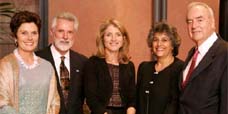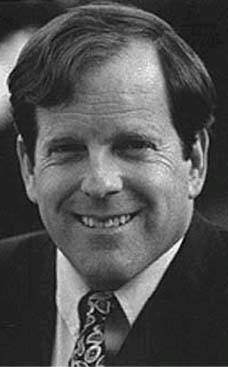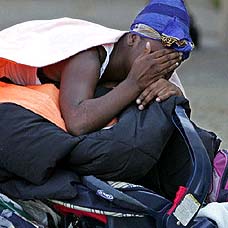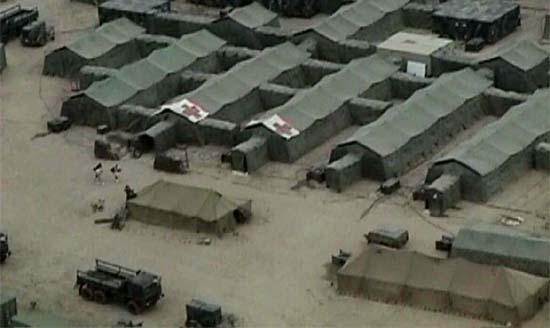
The NPCA has taken the lead from the beginning on the issue of a pilot recruiting program linking Peace Corps service to fulfilling a recruit's eight-year military obligation. In this op-ed piece for the Chicago Tribune, NPCA President Kevin Quigley elaborates on concerns within the returned volunteer community: "While promoting national service is laudable, including the Peace Corps in this program is ill-conceived because applicants for Peace Corps volunteers are coming through military recruitment. This link between the Peace Corps and military recruitment could affect the safety of serving volunteers and the independent status of the Peace Corps."
National Peace Corps Association (NPCA) President Kevin Quigley says Keep Peace Corps, military separate
Keep Peace Corps, military separate
Promoting national service is laudable, but including the Peace Corps in a military program could affect the safety of serving volunteers and the organization's independent status
By Kevin F.F. Quigley, president of the National Peace Corps Association, www.rpcv.org
Published October 16, 2005
An institutional link between the Peace Corps and the military is confusing plowshares with swords and serves neither the Peace Corps nor the military well.
The Army announced last spring the expansion of a pilot recruiting program linking Peace Corps service to fulfilling a recruit's eight-year military obligation. This announcement brought attention to the National Call to Service program, which was enacted as part of a Defense Authorization Bill passed in 2002.
Introduced by Sens. John McCain (R-Ariz.) and Evan Bayh (D-Ind.), the program provides $5,000 enlistment incentives to military recruits for participation in service programs, including the Peace Corps and AmeriCorps.
In late 2003, the Air Force, Navy and the Marines began national recruitment efforts, while the Army's program was piloted in 10 cities. Those efforts went largely unnoticed. However, this program is now getting much closer attention with increased marketing by the military as recruitment goals become harder to meet. Furthermore, more than 4,600 recruits who responded to this program will become eligible for Peace Corps service in 2007.
While promoting national service is laudable, including the Peace Corps in this program is ill-conceived because applicants for Peace Corps volunteers are coming through military recruitment. This link between the Peace Corps and military recruitment could affect the safety of serving volunteers and the independent status of the Peace Corps.
World of greater risk
After the attacks on the World Trade Center and the Pentagon, Americans everywhere became aware that we are living in a world of greater risk. Reflecting this, volunteer safety has been the subject of recent congressional hearings and the highest priority of Peace Corps Director Gaddi Vasquez.
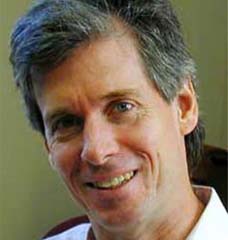
Unlike other Americans who serve overseas, Peace Corps volunteers--often living in isolated rural postings as I did--must rely on a trusting community for their security. Living near the Laotian border in the immediate aftermath of the Vietnam War, I learned that becoming integrated is strongly influenced by the host community's perceptions. Altering those perceptions could affect the community's willingness to extend security for volunteers.
Vasquez says this program essentially codifies existing practice and thus should have no implications for volunteers' safety. He says that about 24 individuals each year are selected to serve as volunteers while fulfilling their final years of military service in the independent ready reserve status. This status means that these individuals cannot be called up for active duty short of a national emergency.
With this new military recruitment program, these numbers could grow dramatically, changing the profile of a small practice where individual soldiers apply on their own for the Peace Corps to a much higher-profile and larger program.
Formal relationship a problem
For many, the current practice of individuals in this independent ready reserve status applying for the Peace Corps is not the problem, but a formal relationship providing incentives and creating expectations about a recruit's eventual Peace Corps service is.
Since its inception nearly 45 years ago, the Peace Corps has fiercely protected its independence as a government agency. This independent status keeps the Peace Corps at arm's length from U.S. short-term foreign policy and national security objectives. This independence is generally thought to be one of the major reasons that the Peace Corps has been as successful as it has been, and it is widely acknowledged as one of the most trusted U.S. organizations overseas.
Although the Peace Corps was not consulted when this legislation was enacted, Vasquez says the military recruitment program will not have an impact on the Peace Corps because the agency retains full authority for the selection and placement of volunteers.
Many in the Peace Corps community see things differently. Passing this legislation without consulting the Peace Corps is indefensible. It sets a precedent for the creation of other programs without consultation. It is also debatable whether the Peace Corps could effectively resist significant pressure from the Defense Department, whose resources dwarf the Peace Corps' about 1,000-1.
This formal link is being intensely debated in the Peace Corps community. A significant majority fear that any blurring of the line between the Peace Corps and the military could jeopardize volunteers' safety and the independence of the Peace Corps. In a survey of about 1,375 members of the Peace Corps community done by Peace Corps Online, 95 percent expressed concern about this military recruitment program, with 85 percent very concerned, 10 percent somewhat concerned, and 5 percent not concerned. Similarly, 94 percent think this program could put volunteers at risk; 84 percent strongly agree and 10 percent somewhat agree, while 6 percent disagree.
Opposition to this military recruitment program is not a partisan issue. Leading members of the Peace Corps community--including former Republican- and Democratic-appointed directors--are concerned about how this program affects the Peace Corps.
Volunteers' views
Volunteers are outspoken and acerbic about this link. There are many within the Peace Corps community who served their country in both the Peace Corps and the military who see things very differently.
For example, John Coyne, who served in the 1960s in Ethiopia and later in the Air Force, sees this program as "a cancer on Peace Corps." Bill Strassberger, who joined the Peace Corps in Cameroon after serving in the Army, suggests that concerns about this link are a knee-jerk anti-military bias.
While there may be some debate in the Peace Corps community about a formal link between the Peace Corps and the Pentagon, there is no debate about the importance of national service. As a community, we believe that service to our country is an American virtue that should be cultivated and encouraged.
As Americans committed to service, people in the Peace Corps community honor those who serve in the military. We proudly acknowledge that many in our community have served in the military and as Peace Corps volunteers and staff.
However, while recognizing the value of both military and Peace Corps service, we must distinguish between the two. The best way to do this is not to have a formal program that provides recruitment incentives linking Peace Corps service with fulfillment of military obligations. For an individual who decides to apply for the Peace Corps, it can be treated, as it currently is, on a case-by-case basis.
Safety, independence at issue
The Peace Corps community's overriding concerns are the safety of its volunteers and its independence. Although this may be overstating the risks, linking the Peace Corps and military recruitment may put some volunteers in harm's way by altering the trusting perception of their host communities, as well as threatening the Peace Corps' independence.
The risks may be small, but any risk is simply too great. There should be no real or perceived mixing of the Peace Corps and the military. Swords can be turned into plowshares, but they should not be confused. The Peace Corps' involvement in this National Call to Service Program as a military recruitment incentive should be discontinued.
Copyright © 2005, Chicago Tribune
